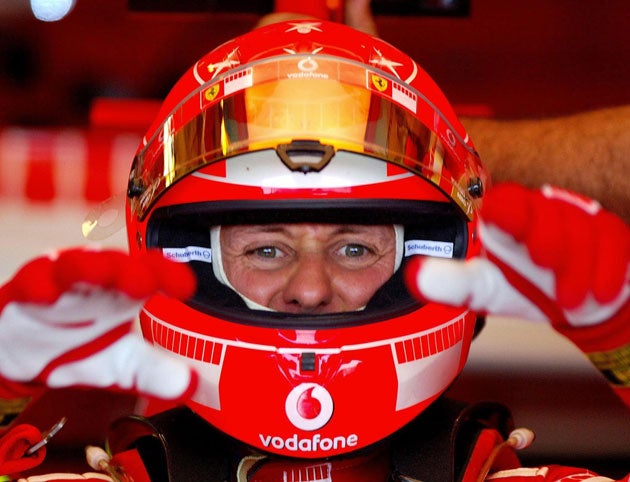The Last Word: Comeback kids don't need to win to succeed
Returns can end in ignominy but Armstrong and Schumacher will earn public's respect and affection

One travels on four wheels, powered by the most sophisticated engine that modern technology can assemble. The other moves on two wheels, driven only by the muscles God gave him.
If Michael Schumacher and Lance Armstrong inhabit very different worlds, there are also a host of parallels that link the motor racing driver and the cyclist. Might Armstrong's example, when he returned last month after four years away from the Tour de France to finish third in the world's most demanding bike race, have played a tiny part in Schumacher's decision last week to return to Formula One?
Armstrong, 37, and Schumacher, 40, both won their holy grail – the Tour de France and drivers' world championship respectively – seven times. Both reigned supreme in their sport but never generated the widespread affection with which, for example, Roger Federer is held in tennis. Maybe both were too calculating, too focused on winning, too ruthless, to win the public's love as well as their respect.
If Schumacher's earnings have dwarfed Armstrong's – in 2004, at the height of their powers, the Forbes list of sport's top earners put the German second on $80m (£48m) and the American 24th on $19.2m (£11.6m) – neither man needed to race again in order to pay their bills.
For the moment, Schumacher's comeback is only temporary as he replaces the injured Ferrari driver Felipe Massa, but who knows what fires will ignite inside once he returns to the track? When Armstrong got back on his bike last summer, he competed in minor events until a second-placed finish in a mountain bike race in the Rockies convinced him that he could make a meaningful impact again at the highest level.
Schumacher's return might just persuade the German that he, too, still has what it takes to compete with the world's best. On the face of it, Schumacher's is the less demanding task. Driving a Formula One car requires high levels of fitness, but not the sort you need to cycle up mountain passes. Schumacher has kept in shape, although he has been recovering from neck injuries sustained in a motor-cycling accident earlier this year.
A bigger issue could be the technological advances since Schumacher competed, particularly the new KERS energy recovery system. The track at Valencia where he will make his return later this month has also been modified since he retired.
Nevertheless, the basic racing skills remain much the same and Schumacher can take heart from a previous Ferrari driver who made a winning return after retirement. Niki Lauda, who won the world title in 1975 and 1977, quit motor racing two years later but returned with McLaren in 1982 and won his third world title in 1984.
Some sporting comebacks – particularly those by many boxers down the years – have ended in ignominy, but it does not have to be that way. Although Armstrong did not win the Tour de France and looked distinctly uncomfortable when he stood on the podium in the unfamiliar position of third place last weekend, he earned as much respect – and probably more affection – than in some of his previous triumphs.
The American's achievement in coming third, after more than three years out of the saddle, was extraordinary. If Alberto Contador, the race winner, had his measure in the mountains and time trials, the small winning margin – Armstrong finished less than six minutes adrift after three weeks of ferocious racing – will have given him hope that he might do even better when he returns with his own team next year.
Armstrong had been used to riding the Tour with a team built around his own needs. The experience of racing in an Astana squad in which Contador was always likely to be the main contender for the yellow jersey was clearly a frustrating one. There was a hint of bitterness from Armstrong as his spat with Contador was played out in public, yet by the end there was probably more sympathy for the American than for the Spaniard.
When Contador made his decisive break on the climb to Verbier, Armstrong Twittered his congratulations within an hour of the stage finish. It was two days later that the seven-times winner showed extraordinary courage and willpower to recover a 30-second gap that Contador and others had opened up on the ascent of the Col du Petit Saint-Bernard.
Armstrong had clearly lost the physical edge that once made him invincible – that was particularly evident in the time trials, where no amount of racing nous can hide your weaknesses – but his tactical genius and his heart for a fight were never in doubt. Pre-race fears that his return would detract from the event itself and turn it into the Lance Armstrong Show proved largely unfounded.
Schumacher's return is great news for a sport with considerable difficulties. The withdrawal of BMW, following that of Honda, is a major blow and underlines the divide between manufacturers and administrators. Schumacher's comeback will return the public's attention to the track.
Like Armstrong, he will not need to win to be a success, although he might find it more difficult to make an impact. In Formula One, the focus is as much on the machine as the man, and on the evidence of this season Ferrari have their problems. Schumacher, nevertheless, has always been a man who likes a challenge.
Join our commenting forum
Join thought-provoking conversations, follow other Independent readers and see their replies
Comments